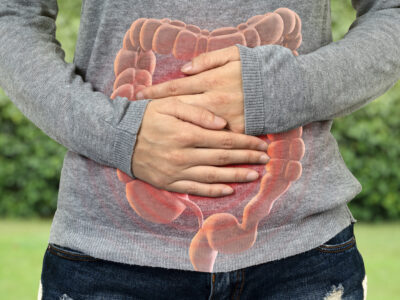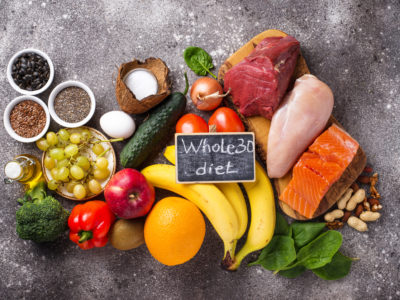Table of Contents[Hide][Show]
14 Tips on How to Speed Up Digestion+−
- 1. Add Lots of Fiber to Your Diet
- 2. Get More Probiotics in Your System
- 3. Eat More Prebiotics
- 4. Drink Plenty of Water
- 5. Make Sure You Are Getting Enough Potassium
- 6. Reduce Sugar in Your Diet
- 7. Try Eating Several Small Meals Per Day If Large Meals Give You Heartburn or Acid Reflux
- 8. Eat Lean Proteins, Such as Fish and Lean Cuts of Meat
- 15 Foods For Healthy Digestion
- 9. Exercise for at Least 30 Minutes Every Day
- 10. Avoid the Consumption of Cigarettes and Alcohol
- 11. Rebuild Your Gut with a Detox
- 12. When Hungry, Drink Water First
- 13. Know the Condition of Your Gut
- 14. Eat Your Food Slowly
- Your on Your Way to Better Gut Health
- 3 Tips For Cleaning Your Colon
- Healing The Gut With Sauerkraut (Easy-To-Follow Recipe)
- Whole 30 and Your Gut Flora
How Your Eating Habits Make You Sleepy and Tired
Here’s why you need to learn how to speed up digestion and metabolism: food comas are no joke! They can be especially troublesome and even dangerous in the workplace.
Known as postprandial somnolence (fancy, huh?) to the medical world, a food coma is defined as a normal state of drowsiness following a meal.
To break this concept down further, think of it as a series of chain reactions. When you consume food, your body goes into a general state of low energy. By this time, the parasympathetic nervous system is activated as a reaction to the increase of mass in your gastrointestinal tract.
This then leads to a specific state of sleepiness caused by hormonal and neurochemical changes related to the rate at which glucose enters your bloodstream and the downstream effects it has on the transport of amino acid in the central nervous system.
In other words, your energy is being diverted to aid in digestion, so “non-essential” functions such as exercise and muscle exertion are placed on the backburner.
As a general rule of thumb, the bigger the meal, the harder it will be for you to stay awake! When you eat a lot at once, your parasympathetic nervous system ends up shifting more of its energy to help with digestion.
What you eat also matters. When you consume foods loaded with fat and sugar, they are quickly broken down into glucose (the simplest form of sugar).
Your body uses glucose for fuel, and this increase will cause a spike in your bloodstream. To counteract this surge in blood sugar, your body then releases more insulin to clean up the excess glucose.
However, the increase in insulin causes your brain to produce more serotonin and melatonin, which are neurochemicals that make you feel sleepy.
As you can see there are a lot of processes that affect your digestion and metabolism, but it is possible to maintain sustained energy throughout the day by making a few changes to when, how, and what you eat.
Related
2 Steps to Improving the Quality of Your Digestion
The Digestion Question: Who are We Really Feeding? Stepping into the health arena can be a bit daunting, especially with the overflow (though wonderful) of nutritional info. Where does one begin to …
14 Tips on How to Speed Up Digestion
If you’re concerned about feeling sleepy after eating, we have some tips that can help you improve your digestion. These tips can teach your body how to speed up digestion naturally and even improve your overall gut health.
1. Add Lots of Fiber to Your Diet
Any healthcare professional will tell you, fiber is one of the top recommended treatments for digestive problems. Try replacing refined carbs (like white bread and pasta) with fiber-rich foods such as beans, seeds, whole grains like quinoa, fruits, and vegetables until at least 75% of your diet consists of these foods.
2. Get More Probiotics in Your System
Probiotics are living microorganisms similar to the beneficial ones naturally present in your gut. You can get probiotic microorganisms from consuming foods, such as kefir, sauerkraut, miso, and kimchi.
Besides fermented foods, other options include yogurt and apple cider vinegar, or you can take a high-quality probiotic supplement (our favorite is Just Thrive Probiotic).
3. Eat More Prebiotics
Prebiotics are found in some greens, onions, garlic, artichokes, bananas, and other fruits and vegetables. They are a form of fiber or complex carbs your body can’t digest but are used to feed the beneficial bacteria in your gut.
Prebiotics are important to digestion, but unfortunately most people do not get enough. Studies have shown that a lack of this fiber can lead to an overabundance of harmful gut bacteria. Prebiotics promote the growth and proliferation of beneficial bacteria in the intestinal tract and increase the absorption of minerals such as calcium and magnesium. Like probiotics, there are prebiotic supplements you can take in addition to eating prebiotic foods to ensure you are getting enough. Our favorite is Just Thrive Precision Prebiotic, which comes in both capsule and powder form.
4. Drink Plenty of Water
The combination of high fiber and water will increase the efficiency of your digestive tract. Most doctors recommend drinking eight 8-ounce glasses per day.
Feel free to experiment with this amount to see if your body requires more water than what’s recommended. People who exercise regularly should increase their water consumption.
For example, you may want to consume an extra 16 ounces of water for every 30 minutes of intensive cardiovascular exercise.
5. Make Sure You Are Getting Enough Potassium
A potassium deficiency can cause a number of digestive issues. This is because part of its job as an electrolyte is to help relay signals from the brain to your digestive system, stimulating muscle contractions that help process food and keep it moving along. When you are deficient in potassium these signals become weak and food moves more slowly, causing bloating and constipation.
It’s usually not difficult to get enough potassium if you eat a balanced diet—especially a plant-based one—but people with kidney or intestinal malabsorption diseases, such as Crohn’s, are at higher risk. Some good sources of potassium are bananas, apricots, artichokes, beans, peas, potatoes and sweet potatoes, spinach, and avocados.
6. Reduce Sugar in Your Diet
Not only can sugar cause stomach pain and cramping in high quantities, but it can also inhibit your immune response, slow digestion, and cause constipation. One way to ensure you are reducing sugars is to consume less processed foods since they tend to contain hidden chemicals and higher amounts of sugar.
7. Try Eating Several Small Meals Per Day If Large Meals Give You Heartburn or Acid Reflux
What is acid reflux? Also known as gastroesophageal reflux (GERD), it is a condition wherein the digestive juices from the stomach rise to the esophagus because the lower esophageal sphincter relaxes.
Your body is better at digesting smaller quantities at a time. After you figure out the amount of food that works well per meal, try to keep a regular schedule that your body can easily adjust to.
8. Eat Lean Proteins, Such as Fish and Lean Cuts of Meat
Proteins are essential for maintaining healthy muscles, but lean cuts are less likely to cause heartburn and will be quicker to digest. In general, high-fat foods take longer to digest than low-fat foods.
Related
15 Foods For Healthy Digestion
Back in the day when Jamie Lee Curtis was lighting up the big screen in movies like True Lies, we probably didn’t anticipate her becoming the face of one of the most heavily pushed products on TV …
9. Exercise for at Least 30 Minutes Every Day
There are endless health benefits of any form of daily exercise. What is good for the entire body is good for the digestive system. Physical activity helps food move through your system and aids in weight loss, which can also help digestion.
Just be sure to schedule your exercise before you eat or wait at least an hour after eating as it can cause indigestion if it’s done right after a meal.
10. Avoid the Consumption of Cigarettes and Alcohol
The chemicals inside these substances can cause nausea, and they can also undermine the benefits of good diet choices. Caffeine may also cause an increase in acidity in the stomach that can lead to high levels of heartburn and acid reflux.
11. Rebuild Your Gut with a Detox
Detoxing is not just a fad! Although it has been on the tip of everyone’s tongues recently, detoxing is a great way to get a healthy gut and improve digestion.
A great way to start is with an organic detox kit including Alkaline Greens, which is a potent blend of super greens.
These superfoods are a rich source of dietary fiber (such as insoluble fiber) and plant-based protein, which are foods that speed up digestion.
It also doesn’t just aid digestion. It can also reduce the risk of chronic inflammation, a condition that may lead to all sorts of digestive symptoms including poor nutrient absorption.
Try Alkaline Greens now and save 20% with code WELL20.
12. When Hungry, Drink Water First
If you want to know how to speed up metabolism to lose weight, you start with drinking water.
Water promotes healthy bowel movements since the colon absorbs water to move the poop out, but it is also helpful for another reason. It turns out people can’t easily distinguish between hunger and thirst.
The cues between the two are so subtle you often cannot immediately tell the difference. In some cases, the symptoms of hunger and thirst, such as a grumbling stomach and headaches, are similar.
In fact, in one study published in the Annals of Family Medicine, shows there’s an association between inadequate hydration and body mass index (BMI).
When you feel “hungry,” try drinking water first and wait for about 30 minutes. If you’re still feeling the pang, go grab some food.
13. Know the Condition of Your Gut
You will better know the foods that speed up your metabolism by knowing how your gut is doing.
- If you have Crohn’s disease, an inflammatory bowel disease, you may want to avoid a high-fiber diet, especially when it’s insoluble fiber.
- If you are suffering from temporary irritation of the intestines and stomach or if you have chronic discomfort from irritable bowel syndrome (IBS), aloe vera may be beneficial as it helps break down enzymes such as carbohydrates, fats, and sugar.
- Ginger tea can be helpful for people with stomach ulcers caused by H. pylori bacteria and non-steroidal anti-inflammatory drugs (NSAIDs), according to 2013 research.
- If you are lactose intolerant or sensitive, you may experience bloating, diarrhea, and other digestive issues after consuming dairy products. You may want to avoid the likes of cheese and milk.
14. Eat Your Food Slowly
Sometimes, you can teach your body to speed up digestion by doing the opposite of moving fast, i.e. eating slowly.
To understand it better, you need to have some idea of how digestion works. The digestive organs function in two ways:
- Mechanical digestion
- Chemical digestion
Mechanical digestion refers to the movements that allow food to travel from the mouth to the anus. These include the involuntary contraction and relaxation of organs such as stomach and intestines called peristalsis.
Chewing is also another example of mechanical digestion, but when food comes into contact, with saliva, chemical digestion begins.
This digestive process involves the breakdown of food by the secretion of enzymes, so it’s easier to digest. Most of all, the gut finds it easier to extract the nutrients and distribute it to the bloodstream.
Your body needs about 24 to 72 hours to complete the entire digestive process, depending on the food you eat. If you don’t slow down, you’re adding more burden to your digestive organs.
Worse, it takes a while before your body recognizes it’s full, so if you eat fast, you end up consuming more. A 2017 study in Circulation revealed it may increase the risk of metabolic syndromes such as heart disease.
Your on Your Way to Better Gut Health
You have the power to help heal your gut, improve your metabolism, and learn how to speed up digestion and elimination. These tips will help you get started and guide you through the right path to better gut health.
You May Also Like…
Editor’s Note: This post was originally published on July 14, 2014, and has been updated for quality and relevancy most recently on April 7, 2021.






